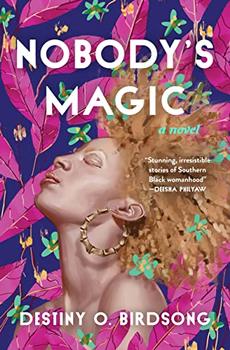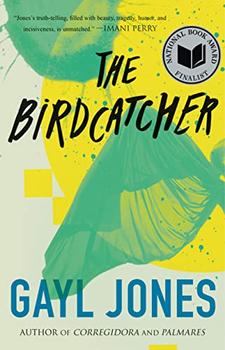Summary | Excerpt | Reading Guide | Reviews | Beyond the book | Read-Alikes | Genres & Themes | Author Bio

This colorful, hilarious and at times frighteningly sad triptych may not conform to expectations of high-brow literature, but it pushes the bounds of what we understand fiction to be and who has a voice to be reckoned with. Destiny O. Birdsong's Nobody's Magic serves everyone at the dinner table: If you haven't read a book with a casual tone in a while, if you're an avid reader who appreciates the art of a beautiful sentence or if you're a writer looking for unconventional ways to tell compelling but ordinary stories about ordinary people, Birdsong's novel is for you.
Nobody's Magic delves into the lives of three different black women with albinism from Shreveport, Louisiana. One story follows Suzette, who is in her early 20s, isn't sure what to do with her life and feels trapped by her overprotective parents. She begins a romance with a mechanic and stays close to her best friend; these characters give her the chance to learn about what she wants. Another story follows Maple, a woman navigating the loss of her mother, who was a sex worker and met an abrupt demise. Maple connects with an unlikely friend who has more in common with her than she could possibly conceive. Lastly, readers follow Agnes, who has a thorny relationship with her family and runs into trouble. She tries to escape her life by fitting into the one a possessive stranger constructs for her. All three of these stories explore respectability politics, race, sexuality and womanhood, and position these themes under the lens of living in a black, southern city.
Birdsong has such a tight command of language, and it is evident that she is a poet from her imagery to her brilliant word choice. A quote from Maple's mother exemplifies this and serves as the crux of this novel: "You ain't supposed to find love. You supposed to make love. You make it up as you go along." Here, Birdsong touches on the expression "to make love" as a euphemism for sex, but she pushes on this phrase to make it more dynamic, emphasizing the difference between the verbs "find" and "make." "Make" is an active verb that requires effort and suggests creation and tailorship. "Find" feels more passive, and investigative at best. Birdsong's characters generally follow a pattern of "finding" or "looking" for love, but epiphanies in their lives happen when they "make" love, whether that be within themselves, others or both.
Don't mistake Birdsong being a poet for her being inaccessible. Her sometimes crude humor is full of pop culture references, as seen in Maple's story: "Ms. P was a rich chocolate brown, over six feet tall, and had the biggest natural titties I've ever seen…And it was torture watching her dance anywhere that wasn't on the pole. You kept wondering when those titties were gonna pop out like the Kool-Aid Man." Moments like this are sprinkled throughout the narrative, showing that the author knows how to play around with voice, construct elaborate, visceral images, and genuinely have fun with her craft. I had a blast laughing at these snippets of humor, but there were also aspects of the narrative that made me crumble into tears. Birdsong understands how to invest people in these characters, both through their grief and their humor.
In Suzette and Maple's stories, summary is couched in action, so the narrative progresses while readers have thorough insight into the characters' dimensional world. The last story, featuring Agnes, is a summary-heavy narrative that focuses more on character background. Because of that, Agnes is less enrapturing than the other characters. For the sake of the story, she needs to have a more internal narrative, but this narrative, tied to her repetitive resentment, made her a bit too boring for me to invest in, despite her family having a complicated, inherently interesting history. Her experiences feel very drawn out and sluggish until the few ending scenes. Even with a rich understanding of what Agnes's conflicts are with her family and the stranger she runs away with, we lose so much of her personality compared to the stronger personalities of Suzette and Maple. Though I wish her voice could have been pushed more so readers could feel more frustration for her when she feels silenced, I did appreciate the overall sentiment of the story and how the narrative progressed.
Destiny O. Birdsong brings visibility to black, southern women with albinism, something entirely congruent with what she knows, by writing these elaborate stories that complicate what it means to exist in a world where you stand out by virtue of your appearance. Her characters having albinism is not the entire narrative, but it plays an important role in terms of how characters around these women react to their existence. Though I do not have albinism, I am a young, black woman who also grew up in Louisiana. Birdsong's work cracked me — and I both laughed and cried with her characters, especially in the moments I saw myself in them. Her spotlighting of an often silenced narrative spoke to me, and her work made me feel less alone, too.
![]() This review was originally published in The BookBrowse Review in March 2022, and has been updated for the
January 2023 edition.
Click here to go to this issue.
This review was originally published in The BookBrowse Review in March 2022, and has been updated for the
January 2023 edition.
Click here to go to this issue.

If you liked Nobody's Magic, try these:

by Tia Williams
Published 2025
In this enchanting love story from the New York Times bestselling author of Seven Days in June, a free-spirited florist and an enigmatic musician are irreversibly linked through the history, art, and magic of Harlem.

by Gayl Jones
Published 2023
Legendary writer Gayl Jones returns with a stunning new novel about Black American artists in exile.
Your guide toexceptional books
BookBrowse seeks out and recommends the best in contemporary fiction and nonfiction—books that not only engage and entertain but also deepen our understanding of ourselves and the world around us.